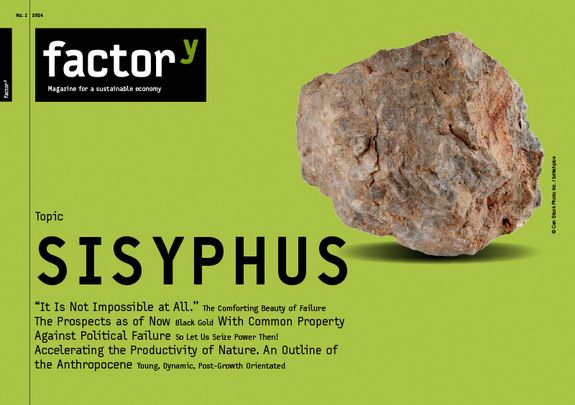Sisyphus

In terms of sustainable development, not every dream can blossom. This fact should not frustrate but encourage. On the aesthetics and necessity of failure.
By Bernd Draser
Translated from the German by Vanessa Kammerer
We are in the sixteenth year after the German Bundestag's inquiry commission ‘Protection of Mankind and the Environment’, in year 22 after the Rio Conference and Agenda 21, in year 27 after the Brundtland Report, in year 34 of the discussion about the energy transition in Germany, in year 42 after the study ‘The Limits to Growth’, in year 148 of the term ‘ecology’ and already in year 301 of the term ‘sustainability.’ Everybody in Germany – and particularly those in power – uses this popular but semantically empty word. This sounds like a legitimate reason for euphoria.
However, people who for decades have been standing up for the protection of resources, climate and the promotion of sustainable development are becoming disillusioned. Despite the massive expansion of the debate, desirable results still fail to emerge. There are halts everywhere, developments are fragmenting, unpredictable events are delaying promising processes, unexpected opposition from surprising quarters is arising and causing frustration. This is reason enough to try a philosophical consolation based on two reminders.
First reminder: sustainable development is no salvation story
Some people who are involved in sustainability still think in terms of admonition and turnaround, repentance and salvation. This is not surprising as the discourse on sustainability repeats theological motifs in more than one respect. It is not beneficial to the cause to use guilt and atonement as an argument if you not only want to be proven right but also want to make a sustainable lifestyle tempting to as many people as possible. A wagging finger is not what you would want as a motivation; instead, it provokes aversion.
Especially risky are alarmist crises and stories about catastrophes that fail to be fulfilled quickly and that evoke malice among those who never believed in them in the first place. The loss of credibility is even worse for those who were ready to change their lives. A well-documented precedent from which a lot can be learnt is the early Christian eschatological expectation in the course of which the followers interpreted every contemporary event as a sign of the imminent return of Christ. The parousia failed to occur, and the epistles of Paul the Apostle are for the most part an almost pitiful effort to justify this failure. Later, encouragement would be derived from them.
After the Fukushima disaster, there was a certain satisfaction perceptible among some anti-nuclear activists; the oft-quoted threat finally became real and even some politicians dropped cynical remarks. So these people were in a better position than the hardly likeable Old Testament prophet Jonah who preached turnaround or destruction to the inhabitants of Nineveh. He was disappointed to see that they actually listened to him, and he started a fight with God because the anticipated spectacular destruction failed to occur.
It might be too trivial to express, but people in favour of sustainable development actually want an absence of disasters. They want to open up the prospect to a possible good life, a realistic, a feasible, a near good life but not a post-apocalyptic hope that requires destruction at first. Sustainable development does not offer sensations but tries to avoid them. Our communication has to become more modest, lenient, joyful and most importantly: more tempting!
Second reminder: sustainable action is essayistic, not instrumental
Acting sustainably means acting in cycles, in consistent and hence natural cycles. The cycles of nature, however, are overly complex for us and cannot be duplicated easily using technical and industrial means. This is not very surprising considering the enormous time period in which evolution happened. Failure is also a part of these cycles. It has to be said that cyclical thinking includes the aesthetics of failure. Consequently, an artist can probably make a more significant contribution to sustainability than a process chemist can.
In many respects, the sustainability discourse is still marked by linear and instrumental ideas. Words like ‘adjusting screws’, ‘measures’, ‘instruments’ and ‘strategies’ are used mechanistically. Hubris of feasibility comes across just as Adorno and Horkheimer describe it in their ‘Dialectic of Enlightenment.’ If sustainable reason, however, is instrumental reason, cyclical thinking and acting will stay foreign to its nature; it will keep trying to cast out the devil by Beelzebub.
He who creates the only possible master plan or, philosophically speaking, the ‘Grand Narrative’, in order to achieve a sustainable development, cultivates the monoculture in his thinking that he tries to get rid of in agriculture. But only if we get rid of monoculture in our way of thinking about sustainability, can the failing of individual attempts, projects, experiments and stand-alone solutions become productive. In other words, the actors in the area of sustainability have to think essayistically instead of strategically, temporarily instead of permanently. The text type of sustainability has to be the essay and not the instruction manual. However, the text type should not be the apocalypse.
The Latin word frustratio has a more active meaning than its English counterpart which is frustration which refers to futile efforts. The Latin word describes the active ‘deception’ rather than the passive ‘disappointment’. He who is frustrated is ‘misled’ or even ‘led on’ like a character in a comedy.
The more seriously we take ourselves, the more likely it is that we become unintentionally funny. This can be avoided. Let’s have a look at the early Christians and their eschatological expectations. They were unintentionally funny when the Savior didn’t come. But they started to accept reality and to live in this world, assuming responsibility for it. They made institutional arrangements in Rome, intellectualized themselves in Athens, adapted the traditions and cultures of their time and left their indelible mark – a sustainable one.
Sustainability has yet to bring about such a transformation of our culture and our thinking. It won’t be an easy way and many times we will fail, but a transformation is possible. This gives us hope. And it will be possible, if we don’t consider failure to be a setback, but rather an experiment that successfully showed us which way not to go. Putting it in Nitzschean terms, our science should become a “Joyful Wisdom”, one that doesn’t enforce a ‘Great Narrative’ upon reality, but one that cultivates the idea of trying, the essay.
The tone of the essay is joy, deriving pleasure from experiments and simultaneously from failing, resisting deadly seriousness and cold instrumentality. And the punchline of every essay is the prospect for a truly successful life, a good life – not in the sense of a certainty of salvation, but as a persistent attempt.
Bernd Draser is a philosopher and teaches at Ecosign Academy in Cologne. He has already contributed to the factory magazine several times with his articles “The art of separating” and Freiwillig nur unter Zwang (voluntary participation only under constraints) in factory Trans-Form.
More articles on the topic of frustration & failure and sustainability are either online or in our factory Magazine Sisyphus. Fine illustrated and good readable on tablet computers and screens the PDF magazine contains all articles and pictures with numbers and citations to topic and is free to download.
Themen
- The Domino Effect: the Mobility Transition as an Engine for the ‘Great Transformation’
- Cities Use the Space
- Decarbonization by 2030
- The fear of biting the hand that feeds you
- Where investing is a pleasure
- Why divestment is going to change the world
- A Robin Hood tax for climate protection
- May the Force Be with Us
- Modern Strategies
- The prerogative of interpreting the future now lies with the companies involved in climate protection”
- From Negotiating to Trading Equitably
- Can a donkey be tragic?
- Rethink rather than rebound: a sufficiency revolution must precede the efficiency revolution
- On Rebound, Prebound and Performance Gaps
- So Let Us Seize Power Then!
- With Common Property Against Political Failure
- So Let Us Seize Power Then!
- The Comforting Beauty of Failure
- “It Is Not Impossible at All.“
- Resource-light shopping
- Men Have Not Stopped Giving the Advantage to Women – So Far
- Toothpaste for Princesses and Soup for Pirates
- It is about equality
- A nice day
- Initiative instead of frustration
- The right ingredients
- Resilient for Life
- Not only, but also
- Appreciation – more please!
- Worth more than money
- Learning to value the value of goods
- Worth and Values
- The Transformative Power of Science
- Historically effective: How innovation and technology transform
- The Disappearance of Products
- Growing Older 101
- Columbus’ Egg
- It Works! In Theory at Least ...
- What If...?
- Analysing Separately – Thinking and Acting Together!
- Let’s Break Away from Determined Breaking Points
- More Gold in Waste than in Mines
- The art of separation
- Should you really DIY?
- The Aesthetics of Do-It-Yourself
- Standing on One’s Own Feet
- From the handaxe to desktop fabrication
- Using Shares to Survive the Crisis
- When Citizens participate
- Possess to Participate
- The Right Growth at the Right Time
- Gunter Pauli and Blue Economy
- When Sustainability Grows
- How we treat Growth
- Illusions about Growth


